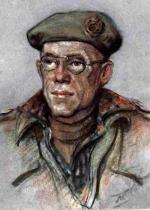John Edward Rogers Wood was born in Fernie, BC in 1906. He was educated at Upper Canada College in Toronto and graduated from the Royal Military College of Canada in 1927 where he was an outstanding member of the football team. He graduated with a degree in Mining Engineering from the University of Toronto in 1930 and worked his profession until he enlisted in the Royal Canadian Engineers in 1940.
Lt Wood proceeded overseas from Camp Debert, Nova Scotia in 1941 with the 6th Field Company and was selected to take part in Operation RUTTER and consequently Operation JUBILEE. He was serving with 2nd Division Engineers when he landed, or rather swam ashore, at Dieppe. Lt Wood’s craft was hung up some 50 feet out and he was not able to achieve his assigned mission. For the first while, he brought wounded men back to the landing craft. When the tide had receded enough, although wounded himself, he spent the rest of the day carrying beehive charges across the beach and rolls of chespaling for tanks until he was taken prisoner and treated for his wounds.
After being captured, he was eventually taken to Oflag VIIB in Eichstatt, about 60 kilometres from Munich in Bavaria. Later that year, along with 64 other prisoners, he made an escape through a tunnel, but like all the rest, was re-captured. He was then sent to Colditz Castle, the inescapable Oflag IVC, where he spent most of the rest of the war. While he was at Colditz, a fellow PoW, Lt WA Millar, an RCE officer also captured at Dieppe, suggested prisoners record their experiences for posterity. Lt Wood became the editor of the collection and had it published in Britain after the war as Detour: The Story of Oflag IVC’. He presented a personal copy to then-Princess Elizabeth and it remains in the Royal Collection. Other copies were presented to the King, Mr. Churchill, prime ministers of all the Dominions, General Crerar and many other personalities of the time. Most of all, Lt Wood expressed an undying debt of gratitude to the Canadian Red Cross for the food boxes sent to Germany for our PoWs and donated all proceeds of the book to the Red Cross. Lt John Watton, a British infantry officer in the Border Regiment captured at Dunkirk and incarcerated at Colditz, illustrated the book with pastel portraits and cartoons.
Lt Wood returned to mining after the war, working mostly in BC and then settling in Vancouver. He spoke of his experiences at many functions and never failed to mention words to the effect, “but those Canadian Private Soldiers, who never did know when to quit, stayed there and took as heavy a concentration of fire as anybody was ever asked to take for over seven hours, and thus added another inspiring page to our Nation's history.” He spoke of the treatment Canadian prisoners were given at Dieppe. Given the situation, the Germans treated the prisoners well. They were disarmed; officers and men were separated; the officers carried wounded; the men marched off. He admired the impartial way the Germans tended our wounded and severe cases got first treatment, irrespective of their uniform.
Lt Wood died in Vancouver in 1973.
During the raid on Dieppe, 19 August 1942, Lieutenant Wood was aboard a landing craft which beached some 50 feet from shore. He swam ashore and returned to the ship several times through heavy fire, assisting aboard the wounded who had attempted to land. This officer was in the water some considerable time, and although wounded himself displayed marked leadership in the rescue of wounded, and with no regard for himself, carried on throughout the entire action, undoubtedly saving many lives. When the tide receded, Lieutenant Wood unloaded and carried ashore beehive charges for engineer demolitions and rolls of tracking for tanks. At this time the landing craft had been hit and was burning. He carried on his work in the open under intense enemy fire without thought for his own safety. he showed remarkable coolness in handling men and was a splendid example to all.


